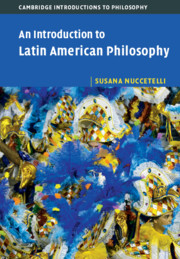Book contents
- An Introduction to Latin American Philosophy
- An Introduction to Latin American Philosophy
- Copyright page
- Dedication
- Contents
- Tables
- Preface
- 1 Setting the Scene: The Iberian Conquest
- 2 Modest and Immodest Feminism
- 3 The Authoritarian Republicanism of Bolívar
- 4 The Liberal Republicanism of Sarmiento and Alberdi
- 5 Homegrown and Imported Positivism
- 6 Martí’s Liberal Anti-Positivism
- 7 Utopian Latin Americanism: Arielism and Mestizofilia
- 8 Soft and Hard Socialism
- 9 Liberation Theology and Philosophy
- 10 Skepticism and Anti-Skepticism About Latin American Philosophy
- Glossary
- Bibliography
- Index of Names and Subjects
- References
2 - Modest and Immodest Feminism
Published online by Cambridge University Press: 15 October 2020
- An Introduction to Latin American Philosophy
- An Introduction to Latin American Philosophy
- Copyright page
- Dedication
- Contents
- Tables
- Preface
- 1 Setting the Scene: The Iberian Conquest
- 2 Modest and Immodest Feminism
- 3 The Authoritarian Republicanism of Bolívar
- 4 The Liberal Republicanism of Sarmiento and Alberdi
- 5 Homegrown and Imported Positivism
- 6 Martí’s Liberal Anti-Positivism
- 7 Utopian Latin Americanism: Arielism and Mestizofilia
- 8 Soft and Hard Socialism
- 9 Liberation Theology and Philosophy
- 10 Skepticism and Anti-Skepticism About Latin American Philosophy
- Glossary
- Bibliography
- Index of Names and Subjects
- References
Summary
Chapter 2 considers some moderate and radical feminist theories from Latin America. It begins with the early vindication of equal rights for women by Sor Juana de la Cruz. Since her feminist theory did not claim that obtaining such rights is contingent on a drastic change of the sociopolitical and economic order, it belongs in the same category of moderate feminism widely advocated by women at the turn of the twentieth century. This chapter contends that, unlike Sor Juana’s feminism, the present-day “scientific” feminism of Roxana Kreimer, also in the moderate category, lacks the support of plausible arguments. Contra Kreimer, no evidence is found for her claim that many inequalities between the sexes amount to inequities (i.e., unjust inequalities). To debunk radical feminisms, Kreimer needs to take a close look at these doctrines, something that this chapter undertakes by focusing on the liberationist feminisms of Ofelia Schutte and Enrique Dussel. Each of these comes out as closer to ideological propaganda than to philosophical inquiry.
Keywords
- Type
- Chapter
- Information
- An Introduction to Latin American Philosophy , pp. 26 - 53Publisher: Cambridge University PressPrint publication year: 2020

